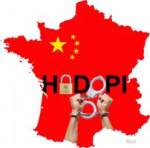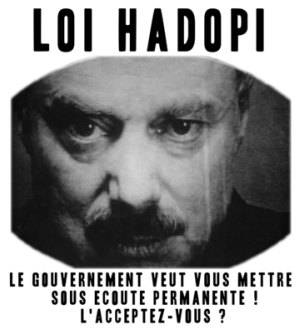French president Nicolas Sarkozy recently announced the so-called Google tax, which would tax online advertising revenues and then use the money to help “legal music platforms.” The tax was, among a few other ideas, suggested by a committee lead by Patrick Zelnik. (Funny enough, Zelnik is also the producer of France’s First Lady and pop singer, Carla Bruni Sarkozy.) That committee’s mission is to suggest ideas to boost digital music sales in France when at the same time, the controversial HADOPI law, which targets illegal file sharers, is about to take effect.

The way the French government handles the booming French digital revolution is quite unique. But the Google tax is just the tip of the iceberg, and is part of a very frightening story, at least for a country that thinks of itself as the inventor of modern democracy.
This guest post was written by Fabrice Epelboin, the editor of the French edition of ReadWriteWeb. He took an active part in fighting the HADOPI “three strike and you’re out” law. He’s a Creative Common evengelist, an entrepreneur and is active in social media and webTV.
The HADOPI law, known abroad as “three strike and you’re out,” will monitor file sharing, and will cut Internet access – after three warnings – to illegal file sharers. But wait. One more thing: French netizens, to prove their innocence will have to install special spyware, which will report their every move to the French administration.
The law, which led to an intense battle between the blogosphere and the government, was rejected by the French Assembly when it was first voted on. Then it was rejected by the French Supreme Court after a second vote, and received some severe warnings from the European Union. A third vote was needed by the French Assembly to pass the law, despite a close to zero support within the French population.

Happy new year
2010 is a brand new year. HADOPI has been voted on and there’s nothing we can do about it anymore, even if it still makes the headlines in the local bloggosphere for its technical difficulties, or that it will probably be a financial disaster, or, more recently, because its brand-new logo illegally used a font licenced exclusively to France Telecom, the state-owned leading French ISP.
This year, President Sarkozy has a new law to pass regarding the Internet. Its name is LOPPSI, and only a small part of it is related to the Internet: filtering it.
The LOPPSI law, which could be voted on in March, will make filtering the French Internet a reality, “the Chinese way”, like Deputy Jacque Myard recently said. Contacts have been established between the French UMP party and the Chinese Communist Party to talk about “Democracy and Internet access” (video, in French), and just like in Australia, pedophiles were used as a very good reason to filter the Internet.
But recently, child molesters weren’t even used as an excuse. President Sarkozy announced filtering will be used to “automatically de-pollute networks and servers used for piracy.” Greentech? Think again.
Many French Internet experts see Deep Packet Inspection coming, even though France’s State Sec. for Digital Economy Nathalie Kosciusko-Morizet, recently answering numerous Twitter requests, has denied DPI was on its way and took some strong positions in favor of net neutrality.
Anti-Counterfeiting Trade Agreement Beta
If nothing is done, within a year, not only might Big Brother-like spyware be mandatory on every French computer, but everything that goes through its pipes could be scanned for possible copyright infringement.
France is more and more looking like a beta test for the proposed multi-country Anti-Counterfeiting Trade Agreement, and it’s not looking good for free speech and democracy.
So far, not a single French newspaper has written anything about ACTA, and before the first battle against HADOPI was won, last March, by the opposition at the French National Assembly, very few had written about HADOPI. The same is happening again with LOPPSI; if you want some information, the only place to go is the Internet and the blogosphere.
Filtering the French Internet has not made the news, either here in France or in the international press: everything is about the Google Tax. Don’t let this fool you. In France, the truth is elsewhere.
France-China photo by Flickr user neo2004pf. Face photo by Flickr user Alexx Sky Productions.

















